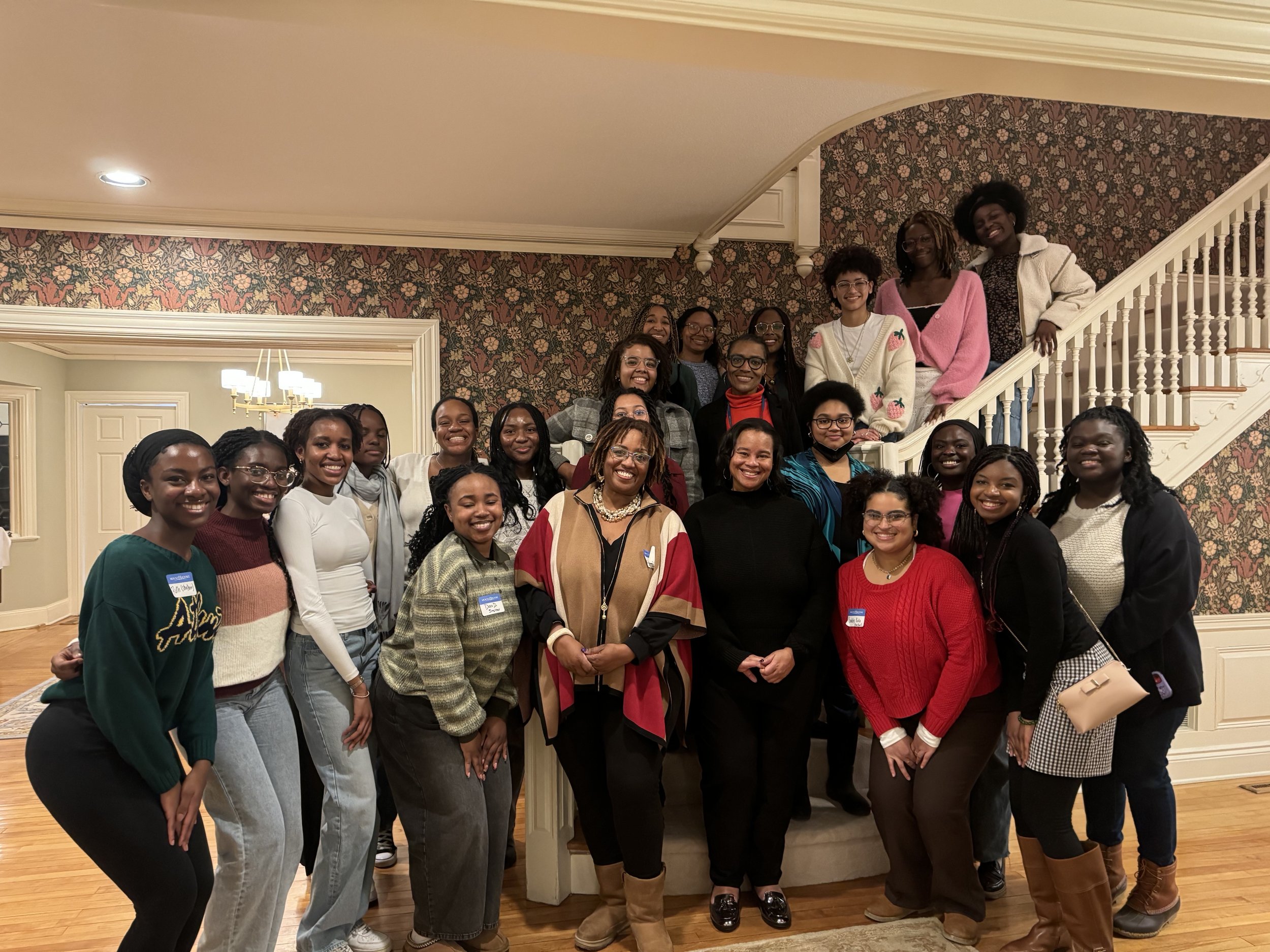Photo by Thandiwe-Wanjiru Delgado-Kinyatti ’27
College President Danielle R. Holley hosted a Black solidarity reception at her house on Jan. 29.
Thandiwe-Wanjiru Delgado-Kinyatti ’27
Staff Writer
On Jan. 29, students made their way to Mount Holyoke College President Danielle R. Holley’s house on College Street, across the road from the gates of the College. Holley opened her doors for all Black students, faculty and staff to enjoy food and drinks provided by the Willits Hallowell Conference Center & Hotel and for a chance to be in community with one another. This event was entitled "Still I Rise: A Black Solidarity Reception" as a part of the Martin Luther King and Coretta Scott King Series on Racial Justice and Reconciliation.
At Holley’s house, clusters of students reconnected after the winter break. Holley shared a few words at the beginning of the event, thanking everyone who had a hand in the organization of the dinner. She expressed gratitude to Nisani Marin ’26 and Amanda Amoabeng ’25, who had approached Holley the semester before with interest in creating an event for all Black students on campus to come together.
Holley took a moment to recognize the Black community at Mount Holyoke, specifically honoring Hortense Parker, the first known Black student to graduate from Mount Holyoke College in 1883. Parker was the first to push her way through Mount Holyoke, and started the process of making the College a more inclusive place, a goal that Black students, staff and faculty are continuing to work towards today.
After addressing the crowd, Holley joined all those gathered at her house and spent the evening talking to the many students who had shown up to be in the community. Multiple students spoke of their admiration of Holley for taking time to talk to students, being able to interact with her and getting to know her on a personal level.
“I love how President Holley is so accessible, because I think a large thing with a lot of other colleges, especially much larger colleges, is that presidents are much more inaccessible,” Claire Clunis ’25 said. “President Holley is so sweet, I was able to very easily talk to her about Black solidarity and just being Black on a college campus.”
Deborah Decius ‘27 expressed a similar sentiment, saying, “I spent a good amount of my time here just speaking to Danielle Holley and … it’s nice to speak to her and get to know her … I got to learn about her as a person, what made her want to come [to MHC].”
President Holley herself reflected on her time in school. “To me, it’s really important to have community on campus. It was one of the most important things,” Holley said. “Being a part of a very small group of Black students both in college and law school, I know how important it is to have community on a campus where there are not a lot of students, so it’s really important that we all get together and really celebrate our community and the history of what Black students have done here at Mount Holyoke.”
Some students in Mount Holyoke’s Black community commented on how it feels good to be in groups of their peers given the country's current political and social state.
“It feels really nice, to be honest, with the way our country is going and the climate right now, just being around people that look like me and relating to the struggles that I’m going through. It feels really nice to know that I am not alone on this campus,” Naomi Hill ’27 said.
Clunis added, “I think it is difficult to be on any college campus today, especially with current things going on, political and social … stuff like this just really gives me hope for our future as the Black community, as Black queer people … This is such a reassuring and generally uplifting environment. It just feels like, honestly, a large family gathering.”
Black Mount Holyoke students have expressed their need and want for community. It brings them joy in good times and bad. Students join organizations and groups such as APAU, MCHASA and the Shirley Chisholm LLC, to name a few, all of which are at the College to serve the Black students and those of the African diaspora.
“This means a lot to me [be]cause we get to see the president who looks exactly like us, and I’m so happy for that,” Precious Biney ’27 said at the President's house as she ate dinner with her friends.
“I want to see that community continue and that means making people feel like, and know, that we have support, and that we have places to gather and places to really build community,” Holley said.
“It’s also in hopes that when more students come to visit us for Admitted Students Day and other things, that they can say there is a place for me here at Mount Holyoke, and that’s really the goal of doing these kinds of events … to make sure that all students that feel in community with identity have a place.” Holley continued, “That’s really important for the Black community here at Mount Holyoke, to feel that there is an identifiable space, that there is space, community and inclusion, and celebration for us.”
Vice President for Equity and Inclusion Kijua Sanders-McMurtry had a similar feeling on the meaning of the event. “Our ‘Still I Rise: A Black Solidarity Reception’ invited students, faculty and staff to gather together and reflect on our collective hope, joy and resilience. It was beautiful to see so many members of our Black community happy and together in President Holley's home,” Sanders-McMurty wrote in an email to Mount Holyoke News.
To smile, to cry, to celebrate or to comfort one another, the Black community of Mount Holyoke College consistently comes together. The night of Jan. 29 felt like a celebration.
Madeleine Diesl ’28 contributed fact-checking.

